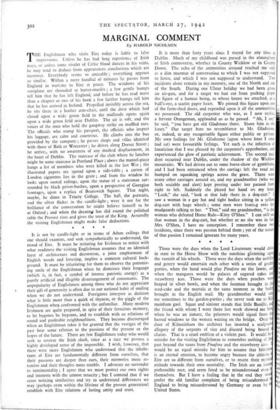It is not by candle-light or in terms of Adam
ceilings that one should examine, and seek sympathetically to understand, the mood of Eire. It must be irritating for Irishmen to notice with what readiness the visiting Englishman assumes that an identical layer of architecture and decoration, a joint employment of English words and lettering, implies a common cultural back- ground. It must be infuriating for them to observe the patronis- ing smile of the Englishman when he dismisses their language (which is, in fact, a symbol of intense patriotic energy) as a purely artificial and illegible disarrangement of consonants. The unpopularity of Englishmen among those who do not appreciate their gift of generosity is often due to our national habit of smiling when we do not understand. Foreigners interpret as derision what is little more than a quirk of shyness, or the giggle of the Englishman when confronted with the unfamiliar. Many modern Irishmen are quite prepared, in spite of their ferocious memory, to let bygones be bygones, and to establish with us relations of sound and profitable neighbourliness. They become discouraged when an Englishman takes it for granted that the vestiges of the past bear some relation to the passions of the present or the hopes of the future. There are few Englishmen today who would seek to reverse the Irish clock, since as a race we possess a highly developed sense of the impossible. I wish, however, that there were more Englishmen who understood that the inhabi- tants of Eire are fundamentally different from ourselves, that their passions are deeper than ours, their memories more re- tentive and their thoughts more nimble. I advocate no surrender to sentimentality ; I agree that we must protect our own rights and interests with the utmost tenacity ; but I contend that if we cease noticing similarities and try to understand differences we may (perhaps even within the lifetime of the present generation) establish with Eire relations of lasting amity and trust.


























 Previous page
Previous page